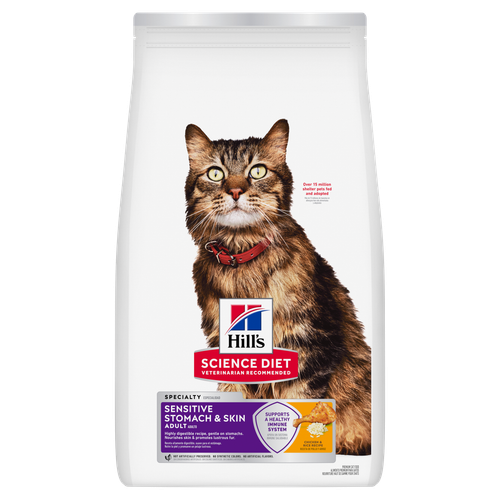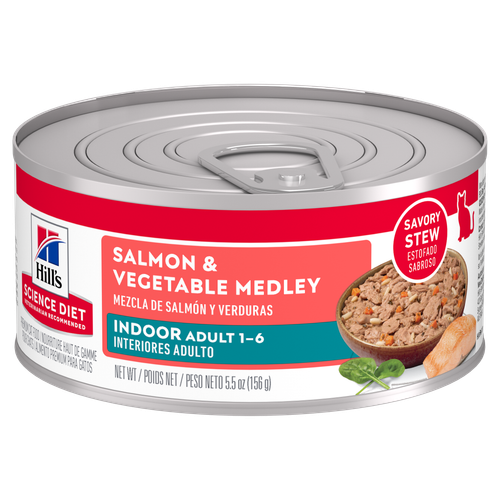
-
Find the right food for your petTake this quiz to see which food may be the best for your furry friend.Find the right food for your petTake this quiz to see which food may be the best for your furry friend.Featured products
 Hill's Science Diet Adult Chicken & Beef Entrée Dog Food
Hill's Science Diet Adult Chicken & Beef Entrée Dog FoodChicken & Beef Entrée in a delicious loaf with complete & balanced nutrition to help keep adult dogs active and healthy
Shop Now Adult Large Breed Chicken & Barley Recipe Dog Food
Adult Large Breed Chicken & Barley Recipe Dog FoodSupports healthy joints, lean muscle, and beautiful coat for large breed dogs
Shop Now Adult Chicken & Barley Recipe Dog Food
Adult Chicken & Barley Recipe Dog FoodSupports lean muscle and beautiful coat for adult dogs
Shop NowFeatured products Hill's Science Diet Adult Sensitive Stomach & Skin Chicken & Rice Recipe Cat Food
Hill's Science Diet Adult Sensitive Stomach & Skin Chicken & Rice Recipe Cat FoodScience-backed nutrition tailored for skin and digestive health, packed with clinically proven, immune system supporting antioxidants.
Shop Now Adult 7+ Senior Vitality Chicken & Vegetable Stew Cat Food
Adult 7+ Senior Vitality Chicken & Vegetable Stew Cat FoodImproves Everyday Ability to Get Up & Go
Shop Now Adult Chicken Recipe Cat Food
Adult Chicken Recipe Cat FoodSupports lean muscle and beautiful fur for adult cats
Shop Now -
Dog
- Dog Tips & Articles
-
Health Category
- Weight
- Food & Environmental Sensitivities
- Urinary
- Digestive
- Joint
- Kidney
-
Life Stage
- Puppy Nutrition
- Adult Nutrition
- Senior Nutrition
Cat- Cat Tips & Articles
-
Health Category
- Weight
- Skin & Food Sensitivities
- Urinary
- Digestive
- Kidney
-
Life Stage
- Kitten Nutrition
- Adult Nutrition
Featured articles What Is Littermate Syndrome? Pet Adoption Guide
What Is Littermate Syndrome? Pet Adoption GuideLearn more about littermate syndrome in dogs and cats and how to successfully navigate adoption and early socialization processes.
Read More How to Properly Mix Wet & Dry Pet Foods
How to Properly Mix Wet & Dry Pet FoodsAn Orange cat eating from a bowl filled with mixed food
Read More The Science Behind Our Love for Pets
The Science Behind Our Love for PetsLearn the scientific reasons why we have such strong connections with our pets, and what science says about the love between humans and our furry friends.
Read More -


As your cat ages, you may notice differences in their activity level, skin and coat health, and mobility. Your cat's nutritional needs change as they grow older, too. Choosing a food for senior cats can help you support your furry friend through their golden years and ensure they get the precise balance of nutrients they need to thrive. Here's what you should know about what to feed senior cats and other tips to keep them happy and healthy.
Why Your Older Kitty Needs Food for Senior Cats



Tasty Tips
Digestive Changes
Your cat is typically considered a senior once they reach 10 years old. At this stage, it can become more difficult for cats to digest food, which can compromise their ability to absorb nutrients. Feeding your cat a complete and balanced food for their life stage can help account for these concerns and ensure they get the essential nutrients they need.
Health Changes
Senior cats are at higher risk of age-related health conditions, including chronic kidney disease, hyperthyroidism and osteoarthritis. Nutrition is a key part of disease management for these and other conditions. If your veterinarian diagnoses your cat with a health condition, they may recommend a food that addresses their specific nutritional requirements. For instance, a cat with chronic kidney disease may require a food with limited protein and targeted vitamins and minerals.
Weight Changes
Senior cats can experience weight gain or loss, so weigh your cat regularly and note any changes. Your veterinarian will also keep an eye on their weight during routine checkups. They can help determine the underlying causes of weight changes and the best treatment, including nutritional requirements.
Weight Gain
Many factors can contribute to weight gain, including overfeeding, decreased metabolism or decreased activity level. Obesity can lead to chronic medical conditions in cats, including diabetes and heart, respiratory, skin and joint issues. If your cat is overweight despite feeding them according to your veterinarian's instructions, your veterinarian may recommend a lower-calorie food to help them regain a healthy body condition.
Weight Loss
On the other hand, senior cats can also be prone to weight loss as their digestive function decreases. In these cases, your veterinarian may suggest a more calorie-rich food.
The veterinarian may also want to test for conditions that lead to weight loss. For example, if your senior cat has a healthy appetite but is still losing weight, your vet may run tests to examine them for thyroid dysfunction, cancer or diabetes. Decreased appetite may be associated with periodontal (gum) disease, gastrointestinal disease, kidney disease or reduced senses of taste or smell. So, consult your veterinarian to determine a diagnosis and the best path to care.

What to Feed Senior Cats
In general, feeding your senior cat a complete and balanced food for their life stage will provide them with the nutrition they need to live their best life. Foods formulated specifically for senior cats are easily digestible and take their nutritional requirements into account. Senior cat foods may include fiber, antioxidants (like vitamins C and E), fatty acids, prebiotics (which feed the healthy bacteria in your cat's gut) and other key nutrients to support healthy immune function, digestion, and eye, heart, kidney and joint health.
Maintaining Your Senior Cat's Health
Depending on your cat's unique needs and circumstances, your veterinarian may suggest some of the following steps to support them at home:
Gradually adjust your cat's caloric intake to match changing physical and environmental conditions (e.g., indoor cats often need fewer calories than cats who spend time outdoors).
Measure food portions to help your kitty maintain an ideal body condition score.
Track weight changes with a baby or pet scale.
Offer toys and feeding puzzles to provide mental stimulation.
Adjust your home's environment to support decreased mobility.
Groom your cat regularly to support healthy skin and coat.
Observe behavior changes and communicate them to your vet.
Feeding your cat a complete and balanced food for their life stage can help extend their years and maintain their quality of life. To best support your cat in their golden years, consult your veterinarian with any concerns, keep regular wellness visits and give them plenty of care, attention and love.


Dr. Laci Schaible is a small animal veterinarian, veterinary journalist, and a thought leader in the industry. She received her Doctor of Veterinary Medicine from Texas A&M University and her Masters in Legal Studies from Wake Forest University.
Related products

Supports lean muscle and beautiful fur for adult cats

Precisely balanced nutrition for indoor cats with the delicious taste of salmon & vegetable medley

Improves Everyday Ability to Get Up & Go

Science-backed nutrition tailored for skin and digestive health, packed with clinically proven, immune system supporting antioxidants.
Related articles

Learn how to litter train a kitten with this guide to potty training, including when to start litter training kittens and troubleshooting tips.

When you adopt a cat, you don't just gain a best friend; you also save her life. Here's why getting a cat from a local animal shelter makes so much sense.

Discover how to train your cat, starting with very basic first steps that both reward good behavior and discourage the bad.

Discover which cat toys games your feline friend might like, and how they are great sources of exercise. Explore our library of articles to learn more.

Put your cat on a diet without them knowing
Our low calorie formula helps you control your cat's weight. It's packed with high-quality protein for building lean muscles, and made with purposeful ingredients for a flavorful, nutritious meal. Clinically proven antioxidants, Vitamin C+E, help promote a healthy immune system.
Put your cat on a diet without them knowing
Our low calorie formula helps you control your cat's weight. It's packed with high-quality protein for building lean muscles, and made with purposeful ingredients for a flavorful, nutritious meal. Clinically proven antioxidants, Vitamin C+E, help promote a healthy immune system.

